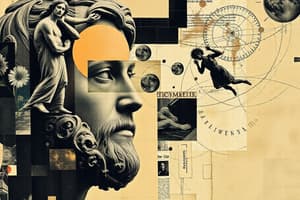Podcast
Questions and Answers
What does the term 'philosophy' derive from?
What does the term 'philosophy' derive from?
- Love of reality
- Love of wisdom (correct)
- Knowledge of truth
- Study of existence
Socrates is known for the development of the Socratic method, which is based on argumentative dialogue.
Socrates is known for the development of the Socratic method, which is based on argumentative dialogue.
True (A)
According to Aquinas, what is the role of the soul?
According to Aquinas, what is the role of the soul?
The soul is the essence of the self, responsible for reason, will, and intellect.
Locke's concept of 'tabula rasa' refers to the idea of a person being born as a _______.
Locke's concept of 'tabula rasa' refers to the idea of a person being born as a _______.
Match the philosopher to their main idea:
Match the philosopher to their main idea:
Which of the following best describes Aristotle's kinds of soul?
Which of the following best describes Aristotle's kinds of soul?
Descartes believed that the act of questioning one's existence is not sufficient evidence of existence.
Descartes believed that the act of questioning one's existence is not sufficient evidence of existence.
What does Hume mean by 'bundle of perception'?
What does Hume mean by 'bundle of perception'?
What concept describes the idea that the self is defined through a collection of perceptions?
What concept describes the idea that the self is defined through a collection of perceptions?
Ryle argues that actions are not related to the self's identity.
Ryle argues that actions are not related to the self's identity.
According to Nietzsche, what must an exemplary human being do to craft their identity?
According to Nietzsche, what must an exemplary human being do to craft their identity?
Marx believed that the self is shaped and constrained by ________ and ________ structures.
Marx believed that the self is shaped and constrained by ________ and ________ structures.
Match the philosopher with their key concept regarding the self:
Match the philosopher with their key concept regarding the self:
Which component of Freud's theory describes the primal part of the mind?
Which component of Freud's theory describes the primal part of the mind?
Merleau-Ponty believes that bodily experience does not influence perception.
Merleau-Ponty believes that bodily experience does not influence perception.
What does Ryle suggest is the best way to understand the self?
What does Ryle suggest is the best way to understand the self?
Study Notes
The Self from Philosophical Perspectives
-
Philosophy is a field of study dedicated to seeking answers to crucial inquiries about ourselves and the world we inhabit.
-
Philosophy is derived from the Greek words "philos" and "sophia", which translate to "love of wisdom".
Socrates
- Developed the Socratic method, a form of argumentative dialogue that involves asking and answering questions to arrive at a deeper understanding of a subject.
Plato
- Believed humans are comprised of three parts of the soul: the rational soul, the spirited soul, and the appetitive soul.
Aristotle
- Identified three kinds of soul: vegetative, sentient, and rational.
Aquinas
- Viewed the soul as the essence of the self, responsible for reason, will, and intellect.
- This distinction is what separates humans from other beings.
Descartes
- Claimed the very act of questioning one's existence is sufficient evidence of existence.
- Argued that individuals can verify their existence through thinking and doubting.
Locke
- Proposed that our identity is formed by recollecting past experiences and memories.
- This concept is known as "tabula rasa", suggesting a person is born as a "blank slate."
Hume
- Argued that our sense perceptions form distinct identities.
- We use the collection of these perceptions, which succeed one another, to define the "self."
Kant
- Proposed the two-fold nature of the self: "homo noumenon" (the self as a noumenal being) and "homo phaenomenon" (the self as a phenomenal being).
Freud
- Proposed 3 parts of the mind: the id, the ego, and the superego.
Merleau-Ponty
- Believed the human body is an expressive space that defines the significance of actions.
- The body is both the origin of movements and the medium through which we perceive the world.
Nietzsche
- Claimed the "exemplary human being" crafts their identity through self-realization, not relying on concepts like God or a soul.
Ryle
- Believed individuals' actions define their concept of self.
- The self is a pattern of behavior; a tendency or disposition to act a certain way in certain situations.
Marx
- Believed that the philosophical self is deeply intertwined with material and social realities.
- The self is not isolated but rather is shaped and limited by social and economic structures.
Alain
- ...
Studying That Suits You
Use AI to generate personalized quizzes and flashcards to suit your learning preferences.
Related Documents
Description
Explore the concept of self through the lenses of various philosophers, including Socrates, Plato, Aristotle, Aquinas, and Descartes. This quiz delves into their unique perspectives on the soul and existence. Test your understanding of these fundamental philosophical ideas.




